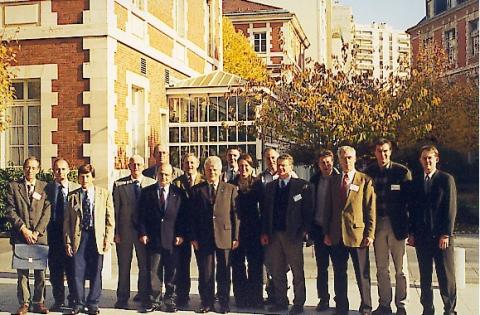Aim of the College
The primary objective of the College shall be to advance health oriented bovine production management in the herd context in Europe and increase the competency of those who practice in this field by establishing guidelines and standards of training for postgraduate education and experience prerequisite to become a specialist in the speciality of bovine health management; examining and authenticating veterinarians as specialists in bovine herd health management to serve the veterinary patient, its owner, the consumer of products originating from the bovine and the public in general, by providing expert care for cattle; encouraging research and other contributions to the science and practice of bovine herd health management including; animal husbandry, internal medicine, surgery, obstetrics and reproductive management, as they relate to the epidemiology, pathogenesis, diagnosis, therapy, prevention, and control of diseases directly or indirectly affecting bovidae and the maintenance of healthy productive cattle herds. Bovine health management also includes, at the level of the animal, those aspects of bovine diseases and bovine derived pathogens that impact on quality and safety of bovine products and gives special consideration to herd health and production, production systems and targets and the management of cattle populations; promoting communication and dissemination of knowledge related to the above.

History of the college
The European College of Bovine Health Management (ECBHM) was provisionally recognised as a College by the European Board of Veterinary Specialisation (EBVS) on October 20th 2003. However, the genesis of the ECBHM began much earlier upon the initiative of prof. Baumgartner (Vienna) and prof. Klee (Munich) at a meeting in Sydney on 7th July 1998 during the World Buiatrics Conference. This meeting marked the beginning of a campaign to establish a European specialist college in the field of buiatrics with the working name ‘European College of Cattle Health and Production.’
The establishment of this working group on specialisation in buiatrics in Europe was a response to significant changes in cattle production with increasing unit sizes, more intensive production systems, coupled with increasing consumer demand for safe food enhanced animal welfare and environmental protection. These changes had resulted in a demand for change in a predominant professional role of cattle vets reacting to problems (‘fire-brigade service’) and treating individuals or small groups of animals to individuals proactive in the management and healthcare of the herd. A provisional organising committee (POC) was subsequently established on 24th November 1998 in Paris. The POC (Drs. Baumgartner, Lekeux, Navetat, Klee, Noordhuizen and Schelcher) worked towards establishing a European College and seeking accreditation by the EBVS. Subsequent meetings of the POC as well as invited guests were held in the following years. However, initial attempts at achieving recognition by EBVS were unsuccessful but the POC decided to continue with the effort of convincing EBVS of the need for a College in bovine health management. In this context, a meeting held in Hannover on 22nd August 2002, attended by Drs. Barrett, Baumgartner, Bradley, Cannas da Silva, Eddy, Enemark, Gentile, Jorgensen, Lekeux, Nuss, Klee, Rollin, Schelcher, Steiner and Szenci, was decisive for the final decision. This meeting was attended also by invited guests from the already established European College of Animal Reproduction (Drs. Hässig and de Kruif). The Hannover meeting, in fact, confirmed the resolve to continue with the ideal of creating a European college of bovine production medicine, and the POC began creating a constitution and a training brochure with the goal of achieving provisional recognition by the EBVS. These efforts were finally rewarded when on October 20th 2003, Professor Wolfgang Klee received a letter from the President of EBVS informing him that the ECBHM had been successful in achieving provisional recognition as a result of an electronic vote. The first meeting of the Board of the ECBHM was held in the Pasteur Institute, Paris on 6th November 2003.
